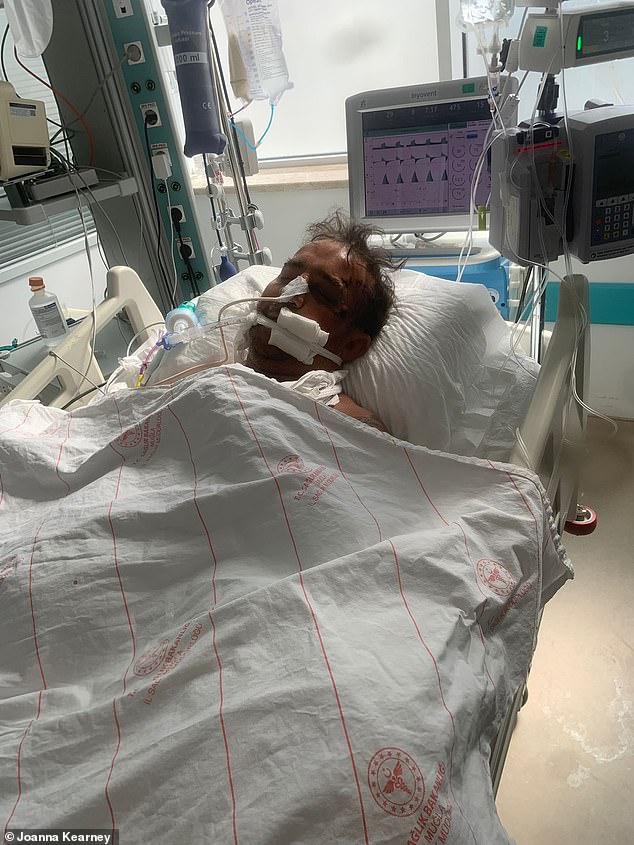A British family holiday turned into a nightmare when Joanna Kearney was allegedly told by doctors in Turkey that she would have to donate one of her father’s organs if she wanted his life support to remain active.
Joanna, 35, said the shocking demand came after she begged for extra time so that relatives could travel to see her father, John, for the final farewell.
Pleading for Time with Her Father
John Kearney, 64, had been in a hospital in Mugla following a horrific scooter accident while on holiday in İçmeler.
Joanna frantically flew out to be by his side, but said her visits were initially limited to just ten minutes.
The hospital allegedly pressured her to make a decision about organ donation in exchange for keeping her father on life support, a demand Joanna described as feeling like “blackmail.”
A Kidney Offered Under Pressure
In a desperate attempt to comply and buy more time for family, Joanna said she offered one of her father’s kidneys, reasoning that “he had two.”
Tragically, she later received messages from a doctor telling her the organ was “not good enough,” and bluntly asking if she still wanted to see her father one last time.
Within minutes, the hospital sent a taxi to take Joanna, a family friend, and the father of her children to his bedside, where she held his hand during his final moments.
The Accident That Changed Everything
John, a handyman from Birkenhead, Wirral, had been enjoying a holiday with friends and his girlfriend Sheila.
Riding a rented scooter without a helmet—a requirement under Turkish law—he collided with a trailer attached to a 4×4, sending him flying and causing a severe brain bleed.
Rushed to the hospital and placed in an induced coma, doctors said surgery would be fatal due to the swelling.
Witnessing the Aftermath
After John’s passing, Joanna was directed to fill out paperwork and witnessed her father’s body being handled in ways she described as “horrific.”
She recounted seeing nurses struggle to place him in a refrigerated compartment, and being asked if she wanted to view his face after he had been placed in the morgue.
The ordeal left her “still trying to process” the experience.
Dealing with Medical Costs and Repatriation
Although John’s travel insurance will cover the cost of returning his body to the UK, Joanna faces ongoing medical bills for the treatment he received abroad.
In a heartfelt social media tribute, she described the overwhelming grief she felt and the messages of support flooding in from friends and family.
A Troubling Pattern
The distressing situation mirrors the case of Beth Martin, a young British mother who died on holiday in Turkey earlier this year.
Beth’s family claimed her heart had been removed without consent, and they were forced to carry her body through the hospital.
The UK Foreign, Commonwealth and Development Office notes that under Turkish law, coroners can take tissue samples or organs without family permission, though in most cases they are returned before release.
Organ Donation and Controversy in Turkey
Turkey has one of the highest organ transplant rates globally, with 61.5 per million inhabitants in 2023, compared to a global average of 25.84.
However, the country has faced accusations of illegal organ trading, and the World Health Organization estimates that one in ten transplants worldwide may involve coerced or unwilling donors.
There is currently no evidence suggesting that John or Beth’s organs were taken illegally.
A Family Left Grieving
For Joanna, the ordeal is a mixture of heartbreak and bureaucratic frustration.
Her father’s tragic accident, the alleged pressure to donate his kidney, and the harrowing final moments have left her with memories she says she will never forget.
In her online tributes and fundraising efforts, she expressed the depth of her loss and the urgent need to bring her father home, while also highlighting the distressing experiences faced by families abroad in similar circumstances.
Share on Facebook «||» Share on Twitter «||» Share on Reddit «||» Share on LinkedIn
